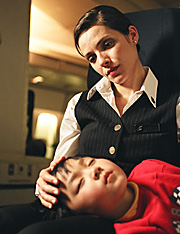If it were an American film, writer-director Ayalet Menahemi’s first feature in 14 years would be called a small independent film. It has a small cast of intimate characters whose lives unfold on a limited number of sets (mostly) in and around an anonymous middle-class Tel Aviv neighborhood. But Israel is a small, independent country and its film industry is not known for blockbuster action-adventure flicks with wall-to-wall car chases and explosions. So Noodle fits right into the mainstream of what we expect to come out of Tel Aviv.
The film stars Israeli film star Mili Avital, who plays Miri, a twice-widowed flight attendant. Miri lives with her sister Gila (Anat Waxman) and teenage niece in an apartment next to her ex-brother-in-law, an El Al pilot, played by another luminary of Israel’s acting community, Alon Aboutboul. But Baouqi Chen, who plays the 6-year-old Noodle, steals virtually every scene as the little boy abandoned (unintentionally, as it turns out) by his mother, an illegal immigrant working as Miri’s housekeeper. To say more about the plot risks giving away too much, as the surprising turns of events are one of the movie’s strong points.
The Miri we meet at the outset is a quietly depressed woman, worn down by the deaths of her two husbands in Israel’s various wars and the constant emotional Punch-and-Judy show she plays out with her sister. The only person to whom she appears close enough to open up to is her sister’s estranged husband, Izzy.
Miri does not welcome her new charge (nicknamed Noodle), because at first the boy, who speaks virtually no Hebrew, refuses to even give his name. His presence and what to do with him are just two more weights added to her shoulders. But gradually the child, in classic film fashion, begins to pry her heart out of the box she has locked it in. The only villains in the piece are the government bureaucracies that need to be navigated — Israel’s in the guise of a nameless immigration officer, and that of the Chinese, implied but never actually seen.
The weakness of the script is in the number and frequency of fortuitous coincidences that the principal characters meet at every turn, made necessary not only by the movie’s limited scope and budget, but also by the need to tie up all the various subplots in pink ribbons of happily-ever-after in its 93 minute runtime.
Seattle Jewish Film Festival: Noodle goes down easily
